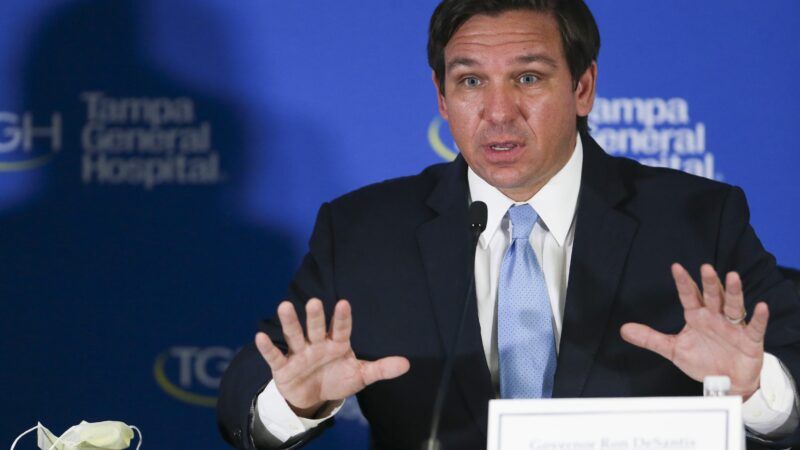By Trying To 'Move On,' DeSantis Admits His Fight With Disney Was a Political Stunt All Along
It was never a principled fight against special privileges granted to a private company.

The fact that Florida Gov. Ron DeSantis is now trying to back away from his fight with the Walt Disney Company should confirm at least one thing about the whole ugly mess.
It was never a principled fight against special privileges granted to a private company. It was a political stunt meant to raise DeSantis' profile on the national stage.
That mission having been accomplished—and with the prospects of a legal battle against Disney looming—DeSantis told CNBC on Monday that he has "moved on" from the issue. He also encouraged Disney to "drop the lawsuit" that it filed in April against his administration.
In that lawsuit, Disney claimed that DeSantis led a "targeted campaign of government retaliation" after the company's then-CEO, Bob Chapek, had spoken out against DeSantis' decision to sign a bill limiting the discussion of gender and sexuality in grade school classrooms. (The ban was later expanded to include nearly all public school classrooms in the state.) DeSantis responded to that criticism by launching a crusade against Disney's special self-governing district, the Reedy Creek Improvement District, culminating in the passage of a state law that gave the governor the authority to appoint a new board to run the zone.
DeSantis and his allies have framed that maneuver as a strike against corporate special interests, but Disney's lawsuit makes a compelling case that the governor specifically targeted Disney to punish the company for Chapek's comments. The complaint draws from numerous public statements and from remarks made within DeSantis' recently published book to argue that DeSantis sought to punish Disney for constitutionally protected speech.
It makes a lot of sense for DeSantis to try to walk away from this fight, in no small part because getting his butt kicked in federal court over a fairly fundamental constitutional issue wouldn't be a good look for a guy who is hoping to become president. Even if he doesn't lose, the lawsuit will be an ongoing source of bad news for DeSantis and will give reporters the opportunity to ask questions he'd rather not have to deal with—like the newly uncovered ethical issues surrounding one of the people DeSantis appointed to the Reedy Creek board. Ending the fight would also save taxpayers from having to foot the legal bills for DeSantis' defense, which is nice.
Still, getting out of this mess is probably not as simple as asking Disney to drop the lawsuit and move on. Does DeSantis intend to ask the state Legislature to undo the governor's control over the Reedy Creek board? If not, then why should Disney back down?
Short of that, it would be useful for reporters to ask DeSantis whether he would take similar actions against other businesses whose executives criticize his policies. Disney obviously has the power to fight back, but others might not be able to do so. Is DeSantis willing to admit he was wrong to retaliate against Disney? The answer would be instructive for voters weighing his candidacy for higher office.
Ultimately, though, DeSantis' attempt to "move on" from the fight with Disney reveals how unserious the whole thing was. If this were a principled stand against corporatism, as DeSantis has claimed, it would be worth seeing the fight through to the finish. That was never the case, however, and it looks like DeSantis simply wants to end this political stunt before it blows up in his face.


Show Comments (200)